LNP, Karen Triano Golin – How would you feel if you graduated from school with multiple job offers? Or that of this school’s 2016 graduating class 98 percent were either employed fulltime or were continuing their education? Sounds “horrible” especially in this age of sky high tuition and student loans, right? Would you believe it’s for real and not a scam?
Truly this school exists and is in our own backyard. Thaddeus Stevens College of Technology has a national reputation for excellence and has been recognized five consecutive times by the Aspen Institute as one of the top two year colleges in the nation based on performance, improvement and equity.
And it’s growing. Laurie Grove, Director of Career services, says the biggest changes in the last five years has been driven by industry demand and baby boomers retiring. “So much of manufacturing has evolved and requires a more skilled workforce for positions that are on the frontline. Several job titles such as industrial maintenance technician and industrial electricians are in extraordinary demand and we started the electro-mechanical technology in response.”
The program, a combination of electrical and mechanical skills using computer aided design and machine technology, teaches a multi-skilled approach to an array of technical and mechanical issues that can minimize downtime when equipment malfunctions and potentially saves a company hundreds of thousands of dollars. The school already had an electrical technology program and demand was so remarkable they doubled capacity in 2013 before adding electro-mechanical technology whose first graduating class was 2016.
Grove says, “By far, no question our most in-demand, highest recruited programs are anything to do with electrical or electro-mechanical.”
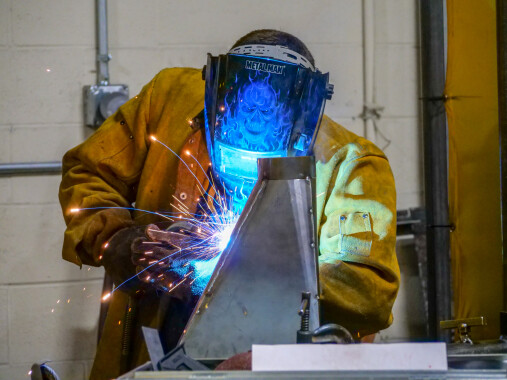
Justin Klunk '18 welding in Metal Fabrication & Welding Technology
Major growth is also being seen in Steven’s welding, metal fabrication and machine tool (CNC) program and computer and network systems administration which added an evening cohort of 25 to double the program’s capacity. As well a computer software engineering program was started this past fall at industry’s request.
Grove has a hard time wrapping her head around the numbers even though she sees them every day. Consider what’s occurred over the last three years. In 2015 Stevens graduated 270, recruited by 912 employers for an average jobs per graduate of 7.1 And note that this represents just those jobs posted by companies intentionally recruiting the school’s students and graduates during a specific time-frame and does not include all jobs available even within Pennsylvania. In 2016, graduates rose to 345, 1,200 employers recruited for 7.7 jobs per graduate. And the 378 graduates of the 2017 class were pursued by 1,331 employers with 8.2 jobs per student, over 3,000 jobs in total.
Even these overall numbers pale for those in certain programs. Electro-Mechanical technology had over 29 jobs per graduate, Mechanical Engineering Technology 26.1, and Machine Tool and Computer-Aided Manufacturing 18.6. The eye popping list goes on.
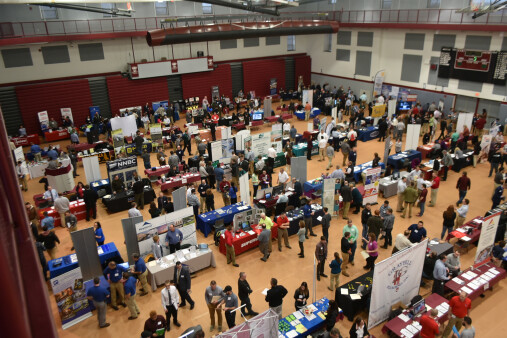
Thaddeus Stevens College of Technology holds annual career fair for TSCT students & alumni
These statistics reinforce how difficult it is to fill open jobs. There are just not enough qualified workers.
Stevens has been creative in their approach. “Internships have historically been more in white collar fields such as engineering, business and marketing,” remarks Grove. “When it gets down to skilled trades you typically don’t hear much about them, and companies are not willing to open their doors. Over the past three years we’ve been doing intentional outreach to help them understand that bringing in students between years one and two will give them hands-on real world experience. For students it helps answer the questions as to whether they want to go into that industry. For companies interning a student increases the likelihood of keeping them on as a worker after graduation.”
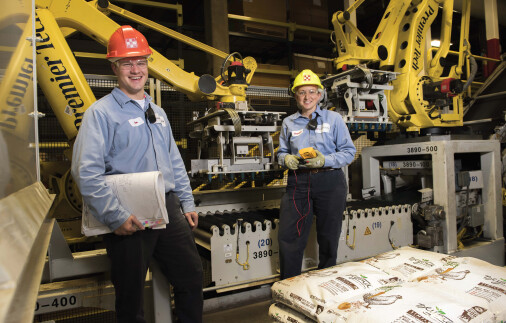
Alums Stephanie Mekhail '17 & Alex Headings '14 currently work at Nestle Purina
And it’s paid off. For the 2017 class, of those graduates who participated in hands-on internships, 97 percent had fulltime job offers prior to graduation and more than 60 percent stayed with the company with whom they interned.
One change Stevens has seen is how industry has gone about recruiting. Instead of just attending a career fair or posting a job they are using a much more comprehensive and combination approach. Recruiters are actively participating on campus. The most recent phenomenon is from companies Grove has never heard of, companies reaching out who found Stevens by googling who is teaching the skill set they’re seeking. Most have been from Pennsylvania, but more and more are out of state.
Each program also has a vibrant industry advisory committee. Each of the 19 major technology programs has an Industry Advisory Council comprised of representatives from business, industry, education, associations and alumni whose experience and abilities represent a cross section of their industry according to Grove.
She explains, “Companies are committing representatives to sit on the committees which meet twice a year. Their voices ensure the curriculum remains relevant, current and what is being used today. We morph and adapt to keep up with industry’s needs. More and more industries are partnering on the committees, not just to have a say, but to build relationships with faculty and to have a face in front of students which is most important to them.”
The biggest change according to Grove is the “whole idea of how employers are approaching recruitment and retention of highly in demand skill sets. The idea of developing partnerships is a big part of how they’re going to change and see success.”
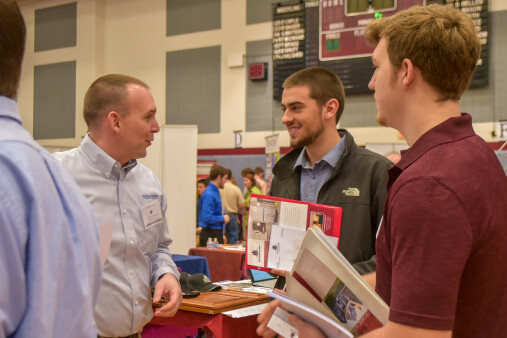 TSCT students talking to Industry reps at TSCT annual career fair
TSCT students talking to Industry reps at TSCT annual career fair
The committee roles reach beyond curriculum and involvement is encouraged in any number of areas including public relations, legislative and leadership activities and more dependent on the company’s time.
Stevens is moving forward in other ways as well. They broke ground in October on a new facility, the Greiner Advanced Manufacturing Center, which will house the machine tool and computer aided manufacturing program, which although already increased, will allow it to double again. Metals Fabrication, welding and HVAC programs will be located there as well.
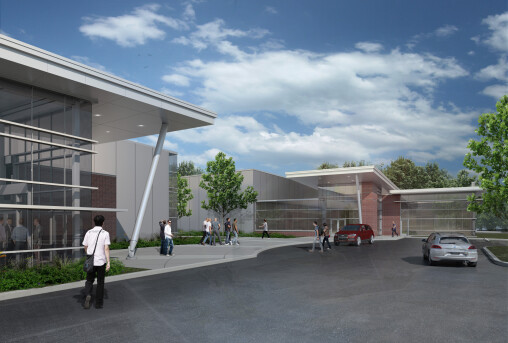 A rendering of the new Greiner Advanced Manufacturing Center
A rendering of the new Greiner Advanced Manufacturing Center
Even with everything they are doing, they will already be at capacity in 2018 and are looking for more ways to expand. But one thing doesn’t change. Stevens only offers programming in fields that have jobs with family-sustaining incomes of $40,000 or more. If not they won’t teach a program.
That’s evident in some of the starting salaries earned by graduates. Averages over the last three years in the construction and manufacturing clusters are #39,700 and $42,237 respectively. And highest starting salaries at $57,400 in Electronic Engineering, $50,999 in Electro-Mechanical Technology, $50,430 in Electrical Technology and $49,575 in Metal Fabrication and Welding Technology as examples.
For the most part, these are salaries earned locally as the vast majority comes from the five counties around Lancaster and stay close to home after graduation. Raise them here, educate them here and keep them here. Not a bad way to build a strong industrial base with a deep community and family ties.

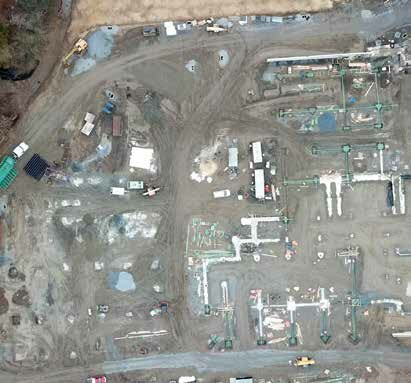
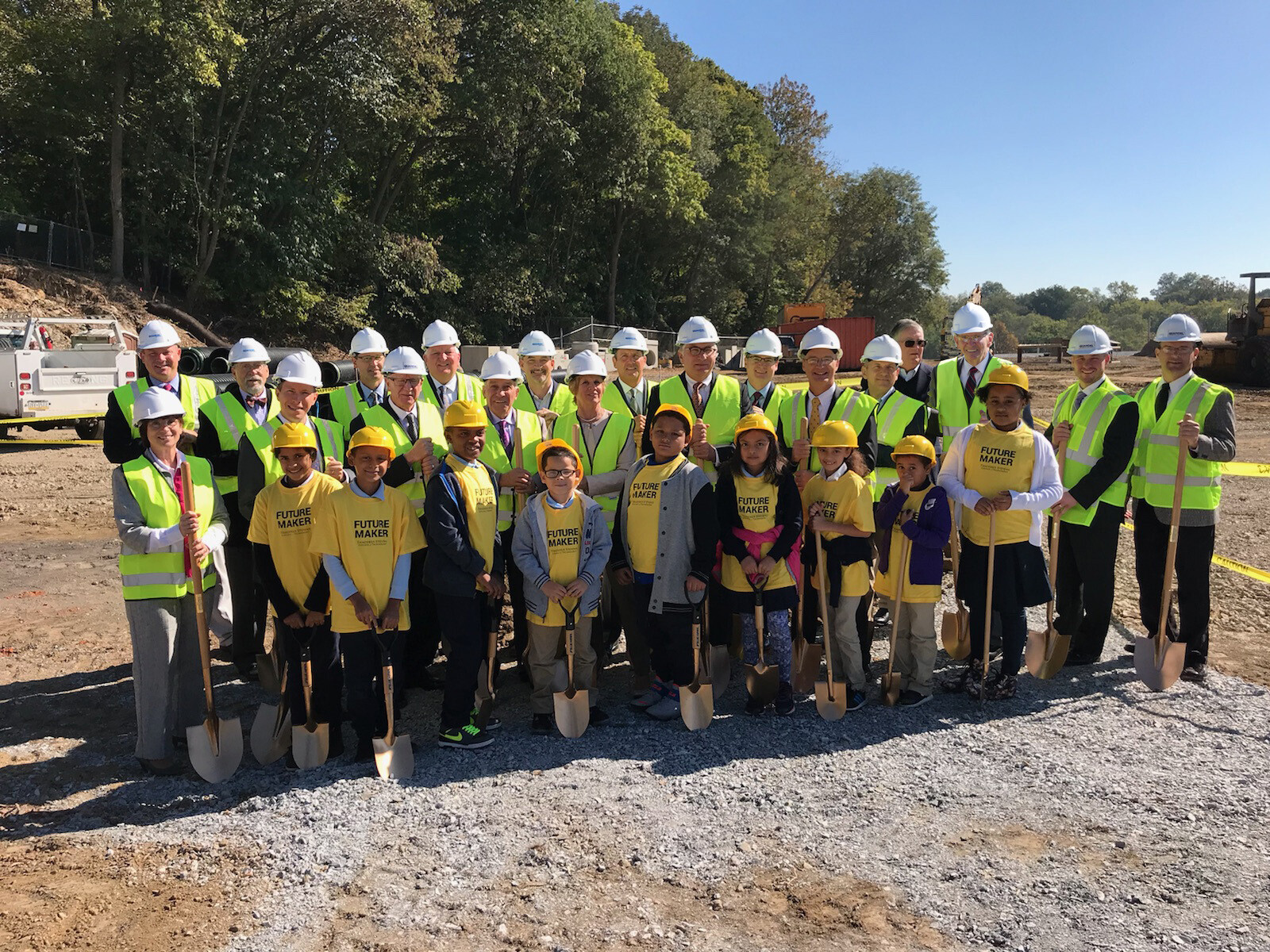
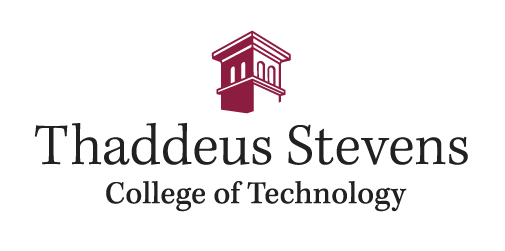
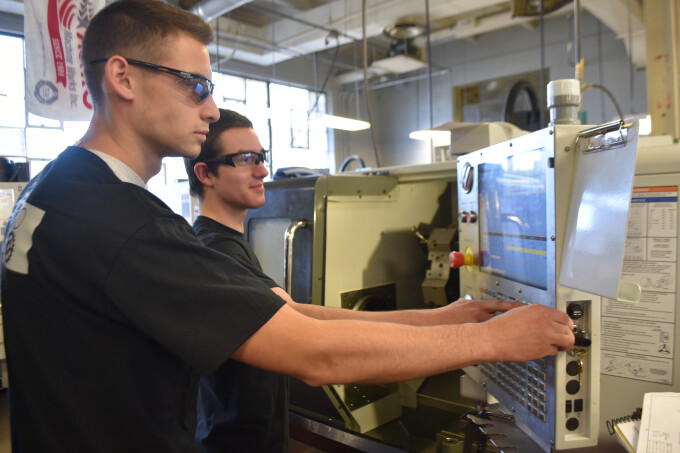



 TSCT students talking to Industry reps at TSCT annual career fair
TSCT students talking to Industry reps at TSCT annual career fair A rendering of the new Greiner Advanced Manufacturing Center
A rendering of the new Greiner Advanced Manufacturing Center